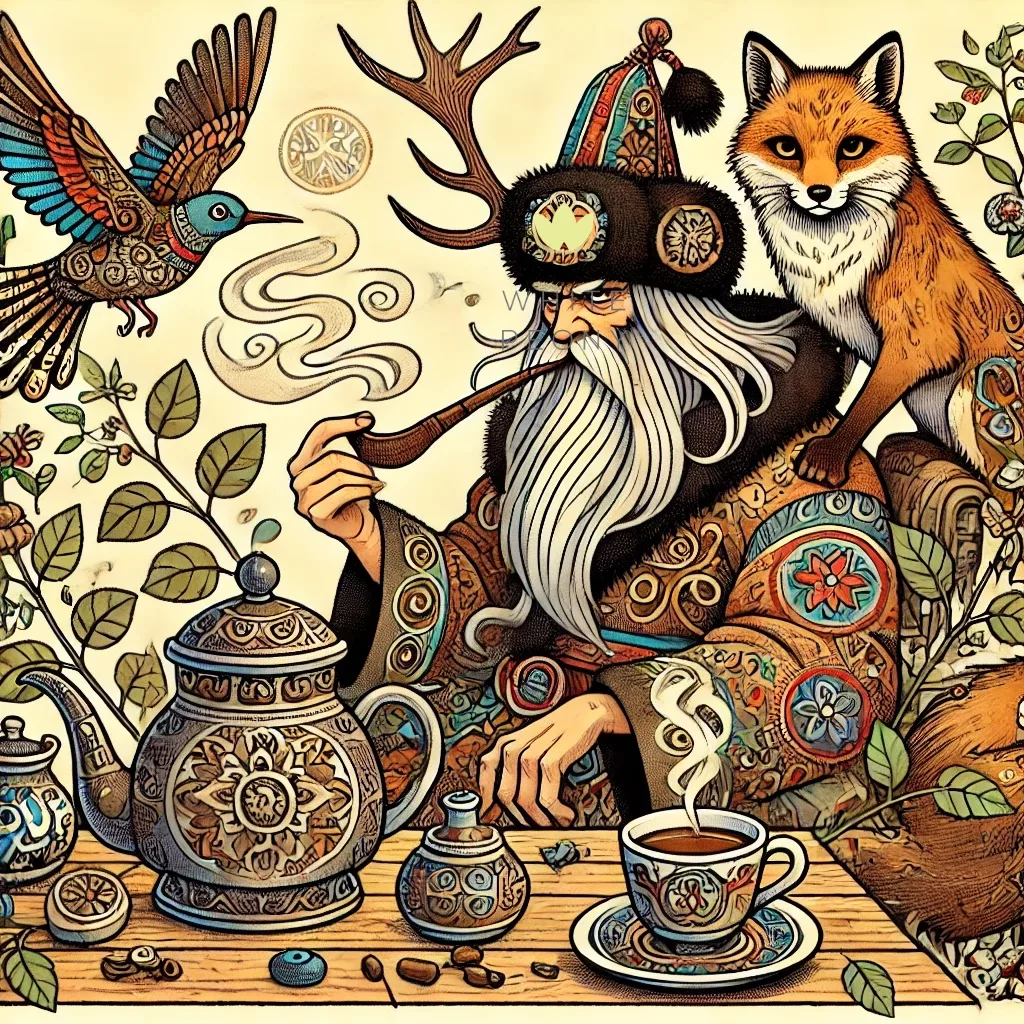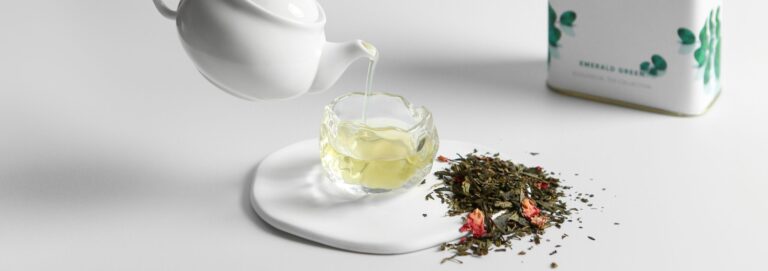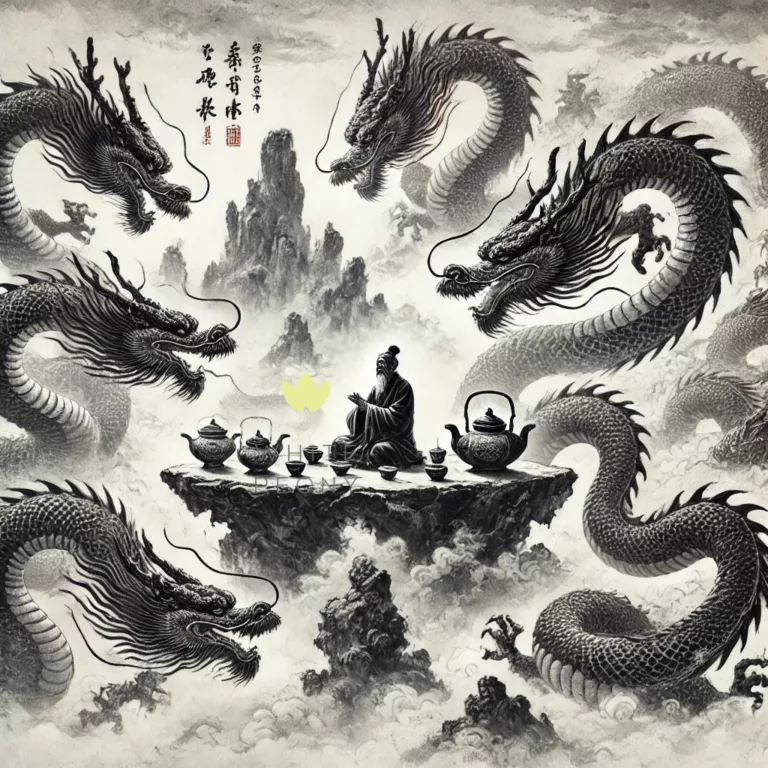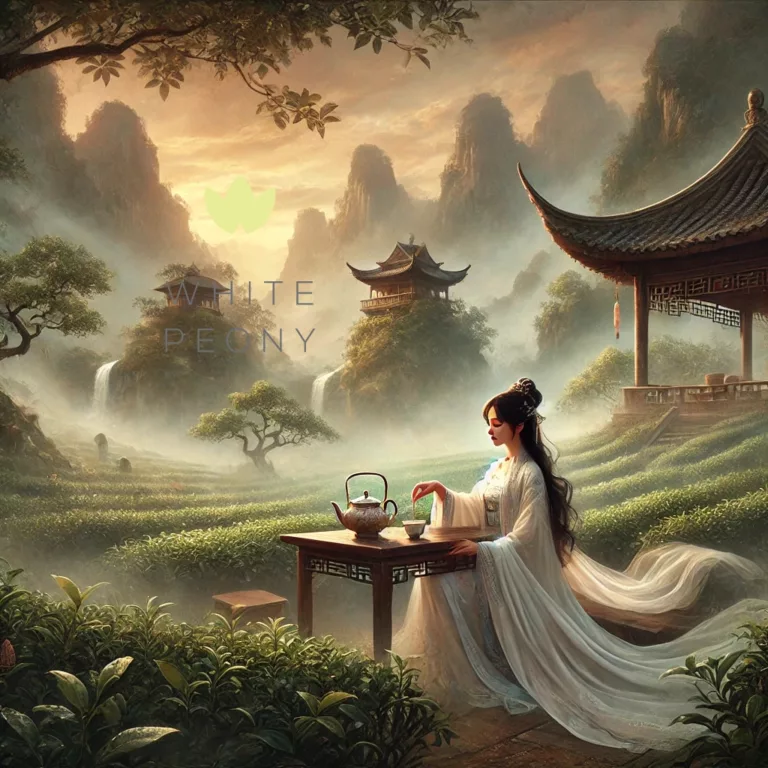- Ingredience:
- 1 lžička organického řeckého horského čaje
1 lžička listů verbeny
Med (volitelné)
Návod: Obě bylinky namočte na 5 minut do horké vody, případně přidejte med. Pomalu popíjejte a přemýšlejte o tajemstvích života nebo jen relaxujte. Lektvar bylinného filozofa: Pohádka z pražských hlubin
Před tisíci lety, kdy Praha nebyla ničím jiným než dlážděným labyrintem uliček a stínů, žil alchymista Ezechiel. Někteří šeptali jeho jméno s úžasem, jiní se strachem, protože to byl muž, který se pustil příliš hluboko do tajemství světa. Zatímco jiní učenci té doby hloubali nad prastarými svazky zapomenuté magie a snažili se odhalit tajemství přírodního světa, Ezekiel hledal něco mnohem temnějšího. Hledal božský, mystický elixír, který by překlenul propast mezi smrtelným a nesmrtelným, mezi zemí a nebesy. Ale hlavně se snažil porozumět skryté řeči rostlin, kterým se dařilo v zapomenutých koutech světa.
Ezechielova laboratoř byla přeplněným doupětem sklenic a lahví, z nichž každá obsahovala bylinky podivného původu. Nebylo žádného kouta nedotčeného vůní schnoucího listí, žádné škvíry, ve které by se nedržely zbytky kořenů a kůry, které byly sklizeny v hluboké noci. Nejzvláštnější věcí však byla jeho posedlost řeckým horským čajem, rostlinou, o níž se tvrdilo, že roste jen na odlehlých vrcholcích, kde byl řídký vzduch a svět pod nimi se zdál jako vzdálená vzpomínka. Málokdo o něm věděl a ještě méně jich ochutnalo jeho tajemný nápoj. Ezekiel slyšel příběhy od potulných obchodníků a jako můra k plameni byl přitahován šepotem jeho vlastností.
Čaj, tak příběh zněl, nebyl jen nápoj. Byl to kanál – prostředek pro komunikaci se samotnými bohy. Říkalo se, že bohyně moudrosti Selene darovala čaj těm, kteří dokázali ovládnout jeho tajemství. Ale Selene nebyla obyčejné božstvo. Byla nepolapitelná, skrytá v závojích neznáma a ti, kdo usilovali o její přízeň, často zaplatili svou cenu. Ezekiel se ve svém šílenství málo staral o cenu. Věřil, že cesta k poznání je cestou obětí, a pokud musí být cenou jeho duše, tak budiž.
Ezechiel léta hledal vzácný řecký horský čaj, cestoval do vzdálených zemí, podplácel věštce a mudrce a dokonce kradl ty, kteří jej chránili. Jednou v noci, když měsíc visel vysoko nad pražskými střechami, seděl Ezechiel sám ve své slabě osvětlené laboratoři. Vzduch byl prosycen vůní bylin a slabé praskání ohně v krbu bylo jediným zvukem, který rušil ticho. Na jeho stole ležela malá sklenice řeckého horského čaje, jejíž listy byly tmavé a bohaté, jako by obsahovaly samotnou podstatu hor samotných.
Když Ezechiel vařil čaj, ruce se mu třásly. Konečně získal rostlinu a nyní nastal čas odhalit její tajemství. Alchymistova mysl se honila s možnostmi. Bylo možné, že starověcí bohové dali tento dar světu a on jediný byl toho hoden? Nalil horkou vodu na listy a sledoval, jak se tekutina změnila na tmavě jantarovou barvu jako barva západu slunce. Usrkl a okamžitě se mu tělem rozlil příval tepla. Nepodobal se žádnému čaji, který kdy ochutnal – směs sladkosti a zemitosti s hořkostí, která přetrvávala na jazyku.
Ale když mu poslední kapka sklouzla do krku, něco se změnilo.
Ezekielův zrak se zamlžil a místnost kolem něj jako by se zkroutila. Sklenice na jeho policích se zakolísaly jako přeludy a stíny vrhané mihotavým světlem svíček se začaly pohybovat vlastním životem. Jeho hlava plavala a vzduch ztěžkl prastarou přítomností. Tehdy uslyšel její hlas – jemný, ale silný, jako by rezonoval ze samotného jádra země.
"Ezechieli," zašeptal hlas, "dal jsem ti tajemství, které hledáš, ale věz toto: Poznání je dvousečná zbraň. Odhalí vám tajemství vesmíru, ale za jakou cenu?“
Ezekielovo srdce se rozbušilo, když padl na kolena a rukama svíral studenou kamennou podlahu. "Selene?" zalapal po dechu a hlas se mu třásl. „Byl jsem vybrán? Co ode mě žádáš?"
"Jsi hledač," odpověděla a její hlas byl nyní symfonií větru a šepotu. "Vypil jsi čaj a otevřel jsi dveře k božskému." Ale musíte vědět: Cena moudrosti je vysoká. Dám ti, co si přeješ, ale tvá duše bude moje."
Ezechielovi se zatočila mysl. Hlavou mu prolétlo tisíc myšlenek, ale žádná se nezdála skutečná. Byl to sen? Iluze způsobená čajem? Nebo to bylo něco víc? Jeho srdce, naplněné směsí strachu a bázně, nemohlo popřít váhu jejích slov. Došel tak daleko – byl skutečně ochoten vzdát se své duše za poznání, po kterém tak toužil?
"Přijímám," zašeptal sotva slyšitelně. „Zaplatím jakoukoli cenu. Ukaž mi tajemství bohů." V tu chvíli se místnost jakoby zhroutila sama do sebe. Stíny se rozplynuly ve zdech a vzduch zhoustl pocitem prastaré síly. Zhmotnila se před ním Seleneina postava, postava světla a stínu, zahalená do hábitu, který se třpytil jako noční obloha. Její oči, staré a vědoucí, na něj upřely, a v tom okamžiku Ezekiel pochopil. Nebyla jen bohyní; byla ztělesněním všeho, co bylo, všeho, co bylo, a všeho, co mohlo být.
"Hledáš Kámen mudrců," řekla a její hlas teď v jeho mysli zazněl jako hrom. "Ale pravý kámen není z tohoto světa. Je to kámen duše. Nabízím vám poznání, ano, ale na oplátku bude vaše duše připoutána k tajemstvím, která se snažíte odhalit. Navždy."
Ezekiel cítil, jak mu žilami proniká chlad, jako by byla odtahována jeho samotná podstata. Natáhl se, ale jeho ruce už nebyly jeho. Čaj, bohyně, vědění – to všechno mu proklouzlo mezi prsty jako písek.
"Tuhle cestu půjdeš sama," zněl Selenein hlas, když zmizela z dohledu. "Ale pamatujte, že filozofův lektvar nikdy neměl poskytnout nesmrtelnost." Mělo tě to připoutat k nekonečné honbě za moudrostí."
Ezekiel padl na podlahu a jeho tělo se třáslo. Poslední věc, kterou viděl, než jeho zrak zmizel, byla slabá záře řeckého horského čaje, který se v šálku před ním stále kouřil. A když ho temnota pohltila, věděl, že překročil práh do nové reality – do té, kde čas a prostor už nevládnou a honba za poznáním je věčná.
Jeho duše, navždy svázaná s tajemstvími starověkého světa, byla nyní součástí lektvaru, který vytvořil. Šílený alchymista se stal součástí legendy, varovného příběhu šeptaného těmi, kdo hledali pravdu, ale báli se ceny. A v pražských ulicích, uprostřed křiku obchodníků a shonu života, se zrodil lektvar Bylinného filozofa – nápoj pro ty, kdo mají odvahu hledat božství, ale nevědí, jakou cenu mohou zaplatit.
Ezechielův osud byl zpečetěn. Jeho mysl, kdysi bystrá a zvědavá, byla nyní ztracena v hlubinách vědění, jeho duše navždy propletená záhadami vesmíru. A ti, kteří se v příštích staletích odvážili pít Lektvar bylinného filozofa, by se ocitli na pokraji šílenství, opojeni šepotem bohyně a navždy připoutáni k cestě nekonečného pronásledování.
Ale možná, že v nejvzdálenějších končinách času by bylo možné stále najít alchymistovy zápisky, pohřbené hluboko v pražských archivech, kde tajemství bohů čekají na dalšího hledače – možná na dalšího blázna –, aby je odhalil.
- 1 tsp Verbena Leaves
- Honey (optional)
- 1 lžička organického řeckého horského čaje
- Directions: Steep both herbs in hot water for 5 minutes, add honey if desired. Sip slowly and contemplate life’s mysteries, or just relax.
The Herbal Philosopher’s Potion: A Tale from the Depths of Prague
A thousand years ago, when Prague was no more than a cobbled labyrinth of alleys and shadows, there lived an alchemist named Ezechiel. His name was whispered by some with awe, by others with fear, for he was a man who had ventured too deep into the mysteries of the world. While other scholars of the time pored over ancient tomes of forgotten magic, seeking to unlock the natural world’s secrets, Ezechiel sought something far darker. He sought the divine, the mystical elixir that would bridge the gap between mortal and immortal, between the earth and the heavens. But most of all, he sought to understand the hidden language of the plants that thrived in the forgotten corners of the world.
Ezechiel’s laboratory was a cluttered den of jars and flasks, each containing herbs of strange origin. There was no corner untouched by the scent of drying leaves, no crevice that did not hold the remains of roots and barks that had been harvested in the dead of night. The most peculiar thing, however, was his obsession with Greek Mountain Tea, a plant said to grow only in the remote peaks where the air was thin and the world below seemed a distant memory. Few knew of it, and fewer still had tasted its mysterious brew. Ezechiel had heard tales from wandering merchants, and like a moth to a flame, he was drawn to the whispers of its properties.
The tea, so the story went, was not merely a drink. It was a conduit—a means of communicating with the gods themselves. It was said that the goddess of wisdom, Selene, bestowed the tea upon those who could master its secrets. But Selene was no ordinary deity. She was elusive, hidden in the veils of the unknown, and those who sought her favor often paid a price. Ezechiel, in his madness, cared little for the cost. He believed the path to knowledge was one of sacrifice, and if his soul must be the price, so be it.
For years, Ezechiel searched for the rare Greek Mountain Tea, journeying to distant lands, bribing seers and sages, and even stealing from those who had protected it. One night, as the moon hung high over Prague’s rooftops, Ezechiel sat alone in his dimly lit laboratory. The air was thick with the scent of herbs, and the faint crackling of fire in the hearth was the only sound that disturbed the stillness. On his table, a small jar of Greek Mountain Tea rested, its leaves dark and rich, as if they held the very essence of the mountains themselves.
As Ezechiel brewed the tea, his hands trembled. He had finally obtained the plant, and now it was time to unlock its secret. The alchemist’s mind raced with the possibilities. Was it possible that the ancient gods had given this gift to the world, and he alone had been worthy of it? He poured the hot water over the leaves, watching as the liquid turned a deep amber, like the color of sunset. He took a sip, and immediately, a rush of warmth spread through his body. It was unlike any tea he had ever tasted—a blend of sweetness and earthiness, with a bitterness that lingered on the tongue.
But as the last drop slid down his throat, something changed.
Ezechiel’s vision blurred, and the room around him seemed to twist. The jars on his shelves wavered like mirages, and the shadows cast by the flickering candlelight began to move with a life of their own. His head swam, and the air grew heavy with an ancient presence. It was then that he heard her voice—soft, yet powerful, as if it resonated from the very core of the earth.
“Ezechiel,” the voice whispered, “I have granted you the secret you seek, but know this: Knowledge is a double-edged sword. It will reveal to you the mysteries of the universe, but at what cost?”
Ezechiel’s heart raced as he fell to his knees, his hands clutching the cold stone floor. “Selene?” he gasped, his voice trembling. “I have been chosen? What do you ask of me?”
“You are a seeker,” she replied, her voice now a symphony of wind and whispers. “You have drunk the tea and opened the door to the divine. But you must know: The price of wisdom is steep. I shall give you what you desire, but your soul will be mine.”
Ezechiel’s mind whirled. A thousand thoughts crossed his mind, but none of them seemed real. Was this a dream? An illusion brought on by the tea? Or was it something more? His heart, filled with a mix of fear and awe, could not deny the weight of her words. He had come this far—was he truly willing to give up his soul for the knowledge he so craved?
“I accept,” he whispered, barely audible. “I will pay any price. Show me the secrets of the gods.”
At that moment, the room seemed to collapse in on itself. The shadows melted into the walls, and the air grew thick with a sense of ancient power. Selene’s form materialized before him, a figure of light and shadow, draped in robes that shimmered like the night sky. Her eyes, ancient and knowing, fixed upon him, and in that instant, Ezechiel understood. She was not just a goddess; she was the embodiment of all that had been, all that was, and all that could be.
“You seek the Philosopher’s Stone,” she said, her voice now a thunderclap in his mind. “But the true stone is not of this world. It is the stone of the soul. I offer you knowledge, yes, but in return, your soul shall be bound to the mysteries you seek to uncover. Forever.”
Ezechiel felt a coldness creep through his veins, as if his very essence was being pulled away. He reached out, but his hands were no longer his own. The tea, the goddess, the knowledge—it was all slipping through his fingers like sand.
“You will walk this path alone,” Selene’s voice echoed as she faded from view. “But remember, the philosopher’s potion was never meant to grant immortality. It was meant to bind you to the endless pursuit of wisdom.”
Ezechiel fell to the floor, his body trembling. The last thing he saw before his vision faded was the faint glow of the Greek Mountain Tea, still steaming in the cup before him. And as the darkness consumed him, he knew that he had crossed the threshold into a new reality—one where time and space no longer held sway, and the pursuit of knowledge was eternal.
His soul, forever bound to the secrets of the ancient world, was now part of the potion he had created. The mad alchemist had become a part of the legend, a cautionary tale whispered by those who sought the truth but feared the cost. And in the streets of Prague, amidst the clamor of merchants and the hustle of life, the Herbal Philosopher’s Potion was born—a drink for those brave enough to seek the divine, but unaware of the price they might pay.
Ezechiel’s fate was sealed. His mind, once sharp and curious, was now lost to the depths of knowledge, his soul forever entwined with the mysteries of the universe. And those who dared to drink the Herbal Philosopher’s Potion in the centuries to come would find themselves teetering on the edge of madness, intoxicated by the whispers of the goddess, and forever bound to the path of endless pursuit.
But perhaps, in the farthest reaches of time, one might still find the alchemist’s notes, buried deep within the archives of Prague, where the secrets of the gods remain waiting for the next seeker—perhaps the next fool—to uncover.







